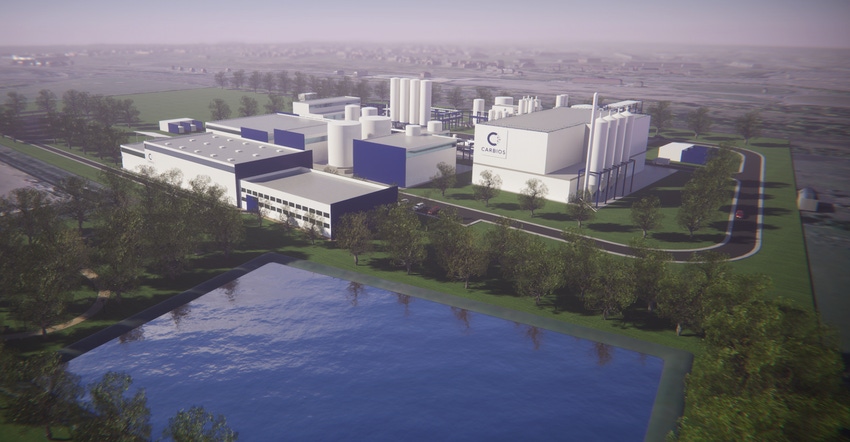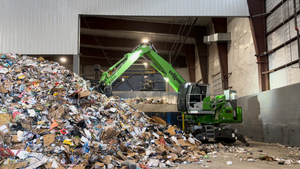Indorama and Carbios Partner on PET Bio-Recycling Plant
Pioneering plant in France is expected to enzymatically bio-recycle up to 50,000 tons of post-consumer PET waste per year starting in 2025.

Plastics and chemicals producer Indorama Ventures, based in Thailand, and Carbios, a biotech company headquartered in France, are creating a joint venture to construct an industrial-scale PET bio-recycling plant in Longlaville, France (rendering of the facility shown above).
The companies have signed a nonbinding memorandum of understanding (MOU) to form the joint venture. The venture’s focus will be an enzymatic PET bio-recycling plant constructed at Indorama’s existing PET production location in Longlaville, which is in France’s Grand-Est Region.
Indorama is a leading producer of recycled PET for beverage bottles, and Carbios has developed a proprietary enzyme-based method for depolymerizing PET. Resin made from these monomers is high-quality, virgin-like PET.
Carbios expects to receive permits by the third quarter of 2023 and start construction of the new bio-recycling plant at the end of the year. Prior to signing the MOU, the joint venture partners worked together for more than a year to evaluate the Longlaville project’s commercial and technical feasibility.
The new facility is expected to start operating in 2025, processing up to 50,000 tons of post-consumer PET waste per year. That will include materials that are not mechanically recyclable — the equivalent of 2 billion colored PET bottles or 2.5 billion PET trays.
It's the latest development in the fast growing market for chemical recycling aka advanced recycling.
PET bio-recycling project structure and funding.
The companies estimate that total capital investment in their new bio-recycling plant will be about €230 million/$246 million. Funding for the project will come from Indorama Ventures, Carbios, the French State, and Grand-Est Region subsidies.
Based on the MOU, Indorama plans to invest about €110 million/$118 million in the joint venture, pending final engineering documentation and final economic feasibility studies. The two partners intend to finalize contract documentation before the end of 2023.
The Longlaville bio-recycling plant will build on Carbios’ previous success with an industrial demonstration plant in Clermont-Ferrand, France, that showcases its enzymatic technology. That facility has been fully operational since July 2022.
“The Longlaville plant will be managed through the joint venture formed by Carbios and Indorama Ventures. Subject to the successful performance of this first plant in France, Indorama Ventures confirms its intention to potentially expand the [enzymatic bio-recycling] technology under license [from Carbios] to its other PET sites for future developments,” an Indorama spokesperson tells PlasticsToday.
Bio-recycling is a step toward a circular PET economy.
Carbios’ solvent-free bio-recycling process supports a circular economy, enabling recycling of all PET waste and production of 100%-bio-recycled, recyclable PET. The waste input may be clear, colored, opaque, or multilayer packaging; apparel; or industrial textiles.
Under the MOU’s terms, Indorama Ventures will repolymerize 100% of the monomers resulting from enzymatic treatment and subsequent purification at the new plant. The two companies will collaborate to secure feedstock supply.
“All of the r-monomers produced will be polymerized into rPET by Indorama Ventures at Longlaville and our other European plants,” the spokesperson says. This “will be used in food and beverage packaging, as well as lifestyle, mobility, and hygiene fiber markets. It will also be sold to Carbios’ partnering brands in the cosmetics, food and beverage, and apparel industries.”
Enzymes for the Longlaville plant will come from Novozymes. “Carbios and Novozymes, the world’s leading enzyme producer, announced an exclusive long-term partnership in January 2023. One of the main points is to ensure the supply of enzymes to the Longlaville plant and to future plants under license,” the spokesperson says.
About the Author(s)
You May Also Like




